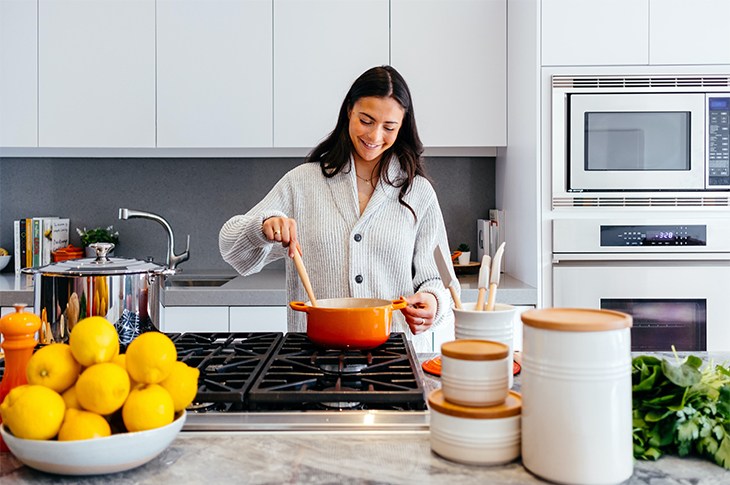
While millions of Americans sheltered at home during the early days of the pandemic, many of us ate considerably more or less than usual, rather than maintaining our typical eating habits, according to recent research that examined the connections between stress and eating habits during the pandemic.
If there are additional lockdowns this winter to help stop the spread of COVID-19, similar stress-related changes to eating habits may resurface again.
The study—which was the first one to look at pandemic eating habits among American adults—asked 838 people to answer questions about their food intake during April 2020. Nearly one-third of participants reported that their diets worsened during the pandemic. Stress levels were found to be higher among those who ate unhealthily.
“In a normal year, we do not see such dramatic and rapid changes in diet,” says study author Jagdish Khubchandani, PhD, professor of public health at New Mexico State University. “We see some minor changes. For example, New Year’s resolutions, holiday weight gain, summertime increase in physical activity. But these are influenced by physiological needs and the environment.”
Researchers found that many study participants followed four unhealthy eating practices more than usual during the early part of the pandemic: 39 percent of people reported overeating, 25 percent said that they skipped meals, 20 percent restricted their eating and 16 percent fasted. Certain groups were more likely to have poor eating habits.
“During the early stages of the pandemic when this study was conducted, the stress burden was greater for women and minorities, causing overeating or skipping meals,” Khubchandani says.
Food insecurity may have caused some people to ration food or skip meals. This winter, food insecurity could become a barrier to healthy eating for some people.
“The situation on food and nutrition will be worse than what we saw when this study was conducted… with food pantries nationwide running short of food, increasing unemployment, lack of supplies,” Khubchandani says. “Community resources are drying up, and individuals have greater vulnerability and stress.”
If you’re more likely to eat less than usual due to pandemic-related stress, try these ideas to maintain good nutrition:
Reach for easy-to-eat snacks. Some people lose their appetites from stress, making eating seem unappealing. You may be less likely to skip meals if you find ways to include nutrient-dense, easy-to-consume foods in your diet.
“If you’re not hungry but worried about skipping meals, try a protein shake or other higher-protein foods with less bulk, such as nuts or nut butters, eggs or string cheese,” says KaTrina Samuels-Garrison, RDN, a registered dietitian nutritionist in Phoenix. “These are all easy and quick foods, and they’re more like snacks rather than the full meals you may not have an appetite for.”
Pre-prepare healthy foods. Figuring out what to eat can be one stressor too many at the end of a long day. To encourage yourself to eat more regularly, prepare a few meals at a time, so that there’s always something healthy waiting for you when it’s time to eat.
“Planning meals out beforehand will take away the stress of having to plan meals last-minute and will allow you to eat regularly,” says Bansari Acharya, RDN, a registered dietitian and nutritionist in Detroit. “When you have something ready in the fridge which you just have to heat up, it decreases the chance for skipping meals.”
Seek local food resources. If you’re dealing with food insecurity, search within your community for food banks and other services that are offering meals or groceries to people in need during these trying times. “No need to feel bad or stigmatized—we are in this together,” Khubchandani says. “Take only what you need, and collect healthier foods… Get fruits and vegetables as much as you can.”
If you find yourself gravitating toward food more than usual due to pandemic-related stress, try these ideas to avoid overeating:
Find different ways to handle stress. Many people reach for comfort food to soothe themselves when they’re anxious or upset. It may be hard to resist your pantry when you’re stuck at home, but other activities can help you combat stress without increasing your calorie intake.
“Realizing that you are stressed and planning strategies that will help you make the best choices will really help,” says Jennifer Cohen Katz RDN, a registered dietitian and culinary nutritionist in Columbia, Maryland. “We have to examine whether our hunger is really coming from frustration, boredom, or maybe loneliness. A great habit to start would be to redirect this energy to taking a walk, jumping on a mini trampoline, phoning to a friend, or working on a hobby.”
Shop differently. Focus your grocery list on fruits, vegetables, nuts, whole grains, low-fat dairy products, and lean protein. Rather than junk food, consider buying higher-fiber, lower-sugar versions of one or two snacks.
“Instead of buying potato chips, you can substitute that with beet chips or quinoa/lentil chips,” Acharya says. “You can substitute a candy bar with dark chocolate almonds. This way, you still obtain the ‘comfort’ feel of the foods, but you are replacing the foods with a healthier alternative.”
Make healthy eating more convenient. Put a fruit bowl on your counter, and add healthy snacks to accessible shelves in your fridge and pantry, so that you’re not tempted to eat high-calorie, nutrient-poor choices. Map out your meals for the week and prepare them before you’re starving, so you’re less likely to order takeout or snack while putting your meal together.
“The goal is to have easy access to satisfying meals [and snacks] which provide the nutrients we need during stressful times,” Katz says.
This information is for educational purposes only and is not intended as a substitute for medical diagnosis or treatment. You should not use this information to diagnose or treat a health problem or condition. Always check with your doctor before changing your diet, altering your sleep habits, taking supplements, or starting a new fitness routine.

If you have questions about a Fitbit tracker, product availability, or the status of your order, contact our Support Team or search the Fitbit Community for answers.
Please note: Comments are moderated and may not appear immediately after submission.